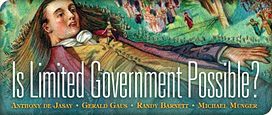In his reply de Jasay makes two claims.
First, he claims, “The saving grace of using interest as the motive of choice is that for all its narrowness, it deals in matter that is identifiable, ascertainable and with a bit of luck even quantifiable.” There is a well-known, notorious, problem with this old view. If we employ a narrow concept of interest, then I think the evidence shows that it is simply false that most political behavior can be explained in terms of such interests. A number of empirical studies show that narrowly interested concerns do not count for most of the variance in electoral behavior. Voters seek environmental goods, social goods (such as less homelessness), and they vote for minimum wage legislation when they are earning $200,000 a year. Overall ideological commitment is a crucial factor, and narrow interest is simply an inadequate explanatory hypothesis. The same goes for politicians; that their overriding concern is interest narrowly defined just does not explain most of what goes on. The interest theorist is then driven to respond by expanding the notion of interest: the rich voters who vote for minimum wage laws are just trying to feel good about themselves! So now “interest” includes a wide array of goods in which people are interested in, and which they seek to promote. It becomes anything but a clear useful concept. IT is the tautological doctrine. A false hypothesis or an empty one — that is what accounts of interest as the root of political motivation must always choose between.
Second, de Jasay asserts:
The moral sentiment most relevant to political choice is fairness. People claim fairness mostly for themselves, but they undoubtedly want it for everybody else as well. However, the notion of fairness is an extraordinarily messy, disorderly one. Theorizing about it is an enterprise rather like herding cats. (The attempt to account for the emergence of fairness norms in Cristina Bicchieri’s highly-rated “social grammar” conjures up in my mind a squadron of over-equipped, late-model fighter planes sent to chase a desert Arab on a donkey).
Ah, I am sure if I knew what all this meant, I would be able to better reply, but simply dismissing Bicchieri’s work in this way deflects us from the core point. There is overwhelming evidence fairness matters to people, and their decisions are affected by it. If it was the case that that which is not clearly quantifiable does not exist, we could dismiss it. But the simple truth is: narrow interest explains some of political behavior, ideological convictions and fairness norms explain a good deal too. Empirical evidence cannot be dismissed with a quip.
What de Jasay and so many classical liberals cannot bear is that an expansive welfare state has been supported largely because the majority of voters and politicians believe it is fair and just. All the quips in the world cannot change that.

